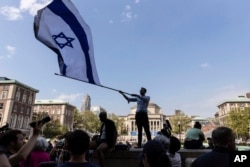The proliferation of large protests against the war in Gaza on several U.S. college campuses is increasingly becoming a target of Republicans’ criticism of President Joe Biden, allowing them to score political points on the president, even as he perseveres in an Israel policy with which the bulk of the Republican Party seems to agree.
In the immediate aftermath of October 7, when Hamas gunmen stormed out of the Gaza Strip and into Israel, killing more than 1,200 Israelis and taking hundreds more hostage, Biden expressed strong solidarity with Israel, promising unwavering U.S. support as the country took steps to defend itself.
In the months that followed, despite expressing some reservations, Biden has continued to voice support for Israel, even as its military response to the Hamas attack has killed more than 34,000 Palestinians, a large portion of them women and children, reduced entire neighborhoods to rubble and restricted humanitarian aid to the point of precipitating a famine.
In Washington, that support has been largely mirrored by members of Congress. Despite some resistance from members of both parties, a large bipartisan majority of lawmakers voted on April 20 for a new aid package for Israel.
Growth of protests
As the carnage in Gaza has mounted, so has public anger among many in the U.S. who view Israel’s response as disproportionate. In multiple cases, that anger has led to public protests, many focused on university campuses.
The protesters’ tone and aim have varied significantly, sometimes within the same protest site. Participants include members of campus Jewish organizations who are supportive of Israel but are concerned about the treatment of Palestinians in Gaza.
In a number of cases, however, the protests have included harsh antisemitic rhetoric and calls for the elimination of the state of Israel. Others have expressed support for Hamas, an organization that has publicly called for the murder of Jewish people.
It is these protesters who have attracted the ire of Republicans in Washington, with some Republican lawmakers trying to draw specific connections between the political left and the most virulent antisemitic protesters.
Archconservative lawmakers like senators Tom Cotton and Josh Hawley have implied that Biden is soft on protesters because he shares some of their political leanings and have demanded that Biden call up the National Guard to disperse them.
“Biden is chained to his pro-Hamas base that is overrun by the same bougie jihadists threatening violence on college campuses,” Hawley wrote on X, formerly known as Twitter. “Send in the National Guard to protect Jewish students.”
In a growing number of cases, university administrators have called in law enforcement authorities to disperse, and sometimes arrest, protesters. This has been met with mixed results.
At Columbia University, one of the first to call in police, the arrests of students were met with additional protests, and the protest camp raided by police was promptly reproduced.
Last week, Representative Elise Stefanik, a vocal critic of the Biden administration, demanded that Education Secretary Miguel Cardona take action to revoke the visas of any foreign students who were suspended by their universities for antisemitic statements.
In a post on the social media platform X last week, Cardona said that his department is in the midst of an investigation into the protests at Columbia, adding, “While we can’t comment on pending investigations, every student deserves to feel a sense of safety and belonging at school. Hate has no place in our schools. All education leaders must stand definitively against hate, antisemitism, anti-Arab and anti-Muslim sentiment.”
Former President Donald Trump, the presumptive Republican presidential nominee, has also used the protests to hammer his rival. On his social media platform Truth Social, he posted, “STOP THE PROTESTS NOW!” on Monday morning.
The former president followed up by blaming his successor for the October 7 attack, claiming that the assault would not have taken place if he had been president, without explaining how.
Democrats’ balancing act
For many Democrats, the aim in recent days has been to strike a balance between defending the right of Americans to stage public protests and denouncing the hateful rhetoric coming from some individual protesters.
Biden himself, while continuing to voice support for Israel, conceded in public remarks that the military response in Gaza has at times been excessive. However, he has also denounced some of the language being used by anti-Israel protesters.
“Even in recent days, we’ve seen harassment and calls for violence against Jews,” the president said in a statement released by the White House last week. “This blatant Antisemitism is reprehensible and dangerous — and it has absolutely no place on college campuses, or anywhere in our country.”
“We should all speak out when protest crosses the line, when it becomes violent or when there’s hate speech,” Democratic Senator Chris Murphy said in an appearance on Fox News on Sunday.
“But 95% of the young people who are on these campuses are there because they believe there is a fundamental injustice being perpetrated in Israel,” said Murphy, who voted in favor of aid to Israel. “We should protect their right to peacefully protest, and you know, we also have a history of overnight, multiday protests in this country. I don’t think there’s anything wrong with protecting the ability of peaceful protests to last beyond a handful of hours.”



